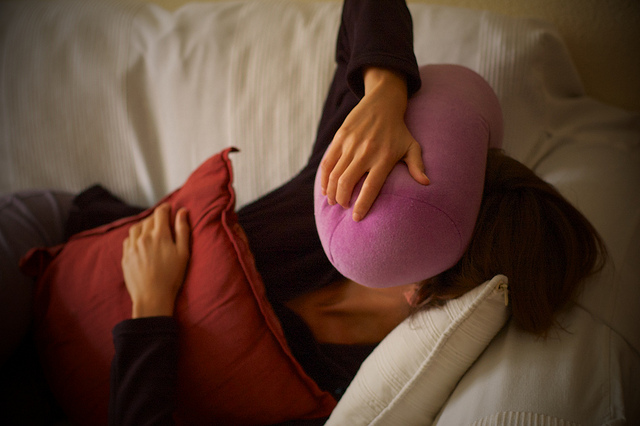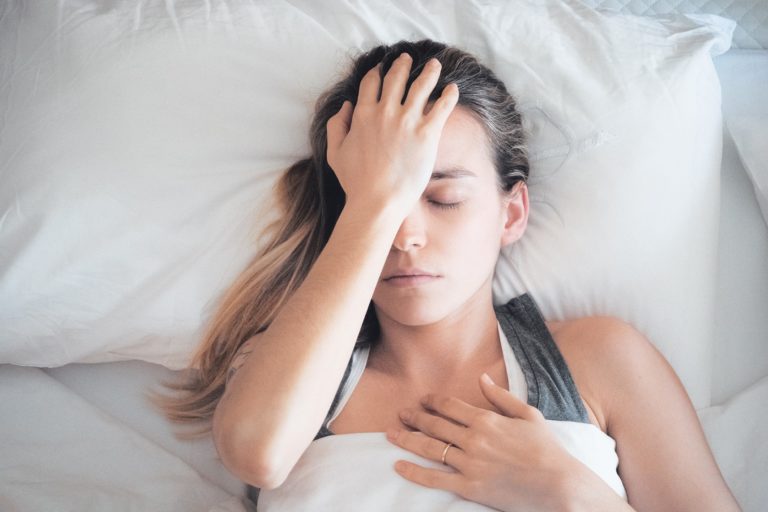Women all over the world are disproportionately affected by headaches and most headache disorders, including migraine.
According to the Migraine Research Foundation (MRF), 18 percent of American women have migraines (compared to 6 percent of men) and more than 90 percent of migraine sufferers miss work or can’t function normally during a migraine attack.
MRF notes that “about half of female sufferers have more than one attack each month, and a quarter experience 4 or more severe attacks per month.” MRF also notes that “more severe and more frequent attacks often result from fluctuations in estrogen levels.” This, of course, gives rise to the suspicion that perhaps women’s hormones are at play in their increased susceptibility to migraines and headaches—hence the concept of menstrual migraines and hormonal headaches.
Menstrual migraines and hormonal headaches
For women of reproductive age whose menstrual cycles are taking place naturally (that is, pre-menopausal women who are not on hormonal birth control, which overrides the menstrual cycle), this fluctuation in estrogen levels happens immediately after ovulation and again with the start of menstruation. For a variety of reasons, it is problematic when a woman has unusually high levels of estrogen, and low levels of progesterone (often considered “estrogen dominance”).
Estrogen dominance is common in women experiencing reproductive issues like polycystic ovary syndrome (PCOS) or endometriosis, and in teenagers who are just beginning to have menstrual cycles. Some women may also experience migraines and hormonal headaches in pregnancy and menopause, as these are also times of extreme hormonal fluctuation.
Birth control, headaches, and migraines
Because hormonal contraceptives override a woman’s natural menstrual cycle by providing a continuous dose of synthetic hormones, some women may begin birth control as a means of controlling hormonal headaches or menstrual migraines. However, migraine with aura is often a contraindication for the prescription of certain kinds of birth control. This means that if you have migraine with aura, your doctor should not prescribe you certain kinds of birth control, as it can increase your chance of stroke. And while some women with hormonal headaches or menstrual migraines may experience relief while on birth control, headaches and migraines are also among some of the most commonly reported side effects of hormonal birth control.
Migraine and vascular risk
Migraines, particularly those presenting with aura, have been long thought to be a result of dilated blood vessels in the brain. This is also probably why migraines are a risk factor for vascular diseases. According to a 2012 paper, “Available data support an increased risk of ischemic and hemorrhagic stroke, cardiac disease, retinal vasculopathy, and mortality [3].” The paper goes on to say that the increased risk is linked to a specific systemic vascular vulnerability that is associated with migraine.
Natural treatments for migraines and headaches
Knowing that migraine sufferers are so much more vulnerable to vascular diseases means they should prioritize healthy life choices such as exercising, eating a reasonable diet, and getting plenty of sleep. But they also have special reasons to steer clear of artificial hormones (particularly artificial estrogens, but also some types of progestins) in any form.
Whether you are seeking to avoid birth control side effects like headache and migraine, or looking to mitigate hormonal headaches and menstrual migraines, learning more about fertility awareness methods and finding a doctor trained in restorative reproductive medicine can help put you on a better path to healing.
Find more articles on headaches and migraines, below.
-

Menstrual Migraines and Hormonal Headaches: How understanding your cycle can help
By Liz Escoffery • October 9, 2020Jessica, who asked that her name be changed, suffered from menstrual migraines. Jessica’s migraine always came at very inconvenient… -

How fertility awareness helped me find solutions for hormonal migraines
By Mary Fagan • December 11, 2021“Have you ever considered whether your migraines might be related to your menstrual cycle? Many women get menstrual… -

What’s the connection between migraines and hormones?
By Cassondra Moriarty • December 3, 2020For anyone who has experienced a migraine before, the word alone is enough to make them run for the hills. As headaches so… -

Migraines, Weight Gain, and More: Women Explain Why They Stopped Taking the Pill
By Mary Rose Somarriba • February 12, 2019“I would experience numbness in the right side of my body — including in my mouth, which would… -

My NFP story: How I learned my migraines weren’t hormone-related
By Christina Valenzuela • July 2, 2024Here’s what my chart showed -

How the brain changes over the course of the menstrual cycle
By Elizabeth Wescott, PhD • February 6, 2025What two new studies tell us -

Here’s how chronic illness can impact your menstrual cycle (and vice-versa)
By Taryn DeLong • June 9, 2022I collect chronic illnesses. It’s not a hobby I’d have picked for myself, but it does give me… -

“Why do I get pre-period bloat?” and other PMS questions, answered: A Natural Womanhood PMS FAQ
By Natural Womanhood • July 2, 2020Premenstrual syndrome, better known as PMS, has long been accepted as a fact of life by many women.… -

How do concussions impact the menstrual cycle?
By Taryn DeLong • October 17, 2024Here’s the “best” time in your cycle to sustain a head injury




